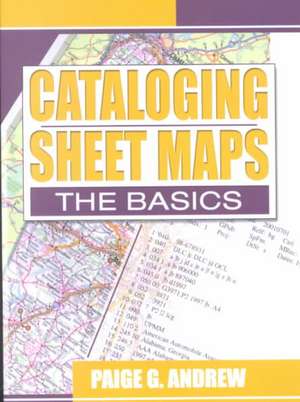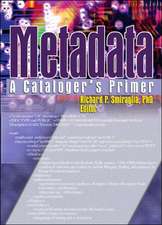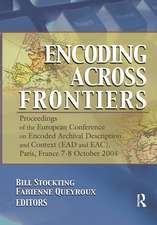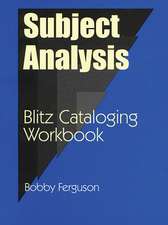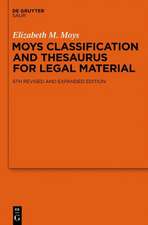Cataloging Sheet Maps: The Basics
Autor Paige Andrewen Limba Engleză Paperback – 31 ian 2003
With an easily understood how-to format, this ready reference manual will introduce you to the basics of cataloging sheet maps on OCLC, using MARC 21 and ISBD standards and AACR2R. It will guide you through each area of the bibliographic record, focusing most specifically on the title and statement of responsibility, mathematical data, physical description, main entry, and notes areas.
Approaching the subject from the perspective that maps are not that much more difficult to catalog than monographs, this book will familiarize you with the few fields unique to map cataloging as well as the fields that are common to monographs but simply used in a different way.
This essential volume:
- describes the cataloging process as it relates to all parts of the record, including subject analysis, coding of fixed fields and OXX fields, and creating G-class call numbers
- provides an up-to-date list of map cataloging tools
- presents special chapters on cataloging historical sheet maps and special formats such as wall maps, map series or sets, and reproductions
- includes illustrations of bibliographic records, field-level examples, tables of information, and diagrams of maps to be used to highlight key concepts
Preț: 249.19 lei
Preț vechi: 327.83 lei
-24% Nou
Puncte Express: 374
Preț estimativ în valută:
47.68€ • 49.78$ • 39.46£
47.68€ • 49.78$ • 39.46£
Carte tipărită la comandă
Livrare economică 04-18 aprilie
Preluare comenzi: 021 569.72.76
Specificații
ISBN-13: 9780789014832
ISBN-10: 0789014831
Pagini: 256
Dimensiuni: 152 x 229 x 18 mm
Greutate: 0.85 kg
Ediția:1
Editura: Taylor & Francis
Colecția Routledge
Locul publicării:Oxford, United Kingdom
ISBN-10: 0789014831
Pagini: 256
Dimensiuni: 152 x 229 x 18 mm
Greutate: 0.85 kg
Ediția:1
Editura: Taylor & Francis
Colecția Routledge
Locul publicării:Oxford, United Kingdom
Cuprins
- Foreword
- Preface
- Acknowledgments
- Section I: In the Beginning
- Chapter 1. Background
- What Is a Map?
- Why Bother to Catalog Sheet Maps?
- Chapter 2. Introduction to Map Cataloging
- A Good Way to Begin
- The Concept of “Main Map”
- Chapter 3. Necessary Tools of the Trade
- Basic Cataloging Tools
- Essential Tools
- Helpful Tools
- Chapter 4. Sources of Information
- Chief Source of Information
- Prescribed Sources of Information
- Section II: Coded Fields
- Chapter 5. Cartographic-Specific Fixed Fields
- Chapter 6. General Fixed Fields
- Chapter 7. Coded Variable Fields
- Mandatory Coded Fields for Cartographic Materials
- Coded Variable Fields That Are Required When Applicable
- Optional Coded Fields for Cartographic Materials
- Section III: Description of the Map
- Chapter 8. Main Entry and Statement of Responsibility
- Main Entry Under Personal Author
- Main Entry Under Corporate Body
- Main Entry Under Title
- “Emanating from” and Its Relationship to the Statement of Responsibility
- Copyright Holders As Responsible Parties
- Terms That Indicate Responsibility for a Map
- “Prominence” and Its Relation to Statement of Responsibility
- Summary
- Chapter 9. Providing a Title for the Record
- When Only One Title Exists
- Choosing a Title When There Is More Than One
- Providing for Additional Titles and/or Different Ways to Read the Chosen Title
- The “Scattered Title” Phenomenon and How to Handle It
- When to Use a Collective Title As Primary Title
- What to Do with an Untitled Map
- Other Title Circumstances
- Providing a “Source of Title” Note
- Chapter 10. Edition
- Editions to Individual Sheets in a Map Series
- Uncertainty Regarding an Edition Statement
- Chapter 11. Mathematical Data Area
- Scale Information
- Projection Information
- Statement of Coordinates
- Chapter 12. Publication Information
Descriere
This ready reference manual will introduce you to the basics of cataloging sheet maps on OCLC, using MARC 21 and ISBD standards and AACR2R. It will guide you through each area of the bibliographic record, focusing most specifically on the title and statement of responsibility, mathematical data, physical description, main entry, and notes areas.
